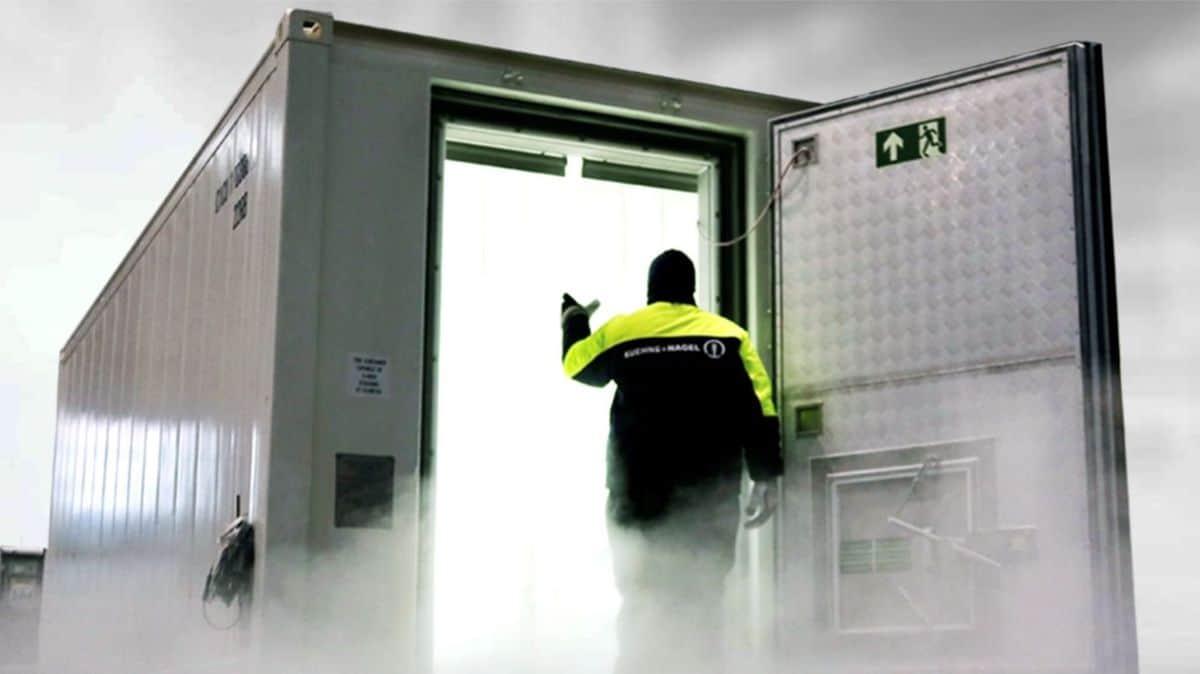The race to distribute the first COVID-19 vaccines is picking up pace around the world as the massive shipping campaign continues for a third day in the U.S.
Express carriers FedEx (NYSE: FDX) and UPS (NYSE: UPS) are making deliveries of Pfizer Inc.’s vaccine to 425 medical centers and other drop locations Tuesday following Friday’s emergency use authorization by the Food and Drug Administration.
On Tuesday, United Airlines officially confirmed widespread reports that it was the first commercial airline to fly the vaccine to the U.S. from Belgium, where Pfizer has a plant. In a statement, the Chicago-based company said it operated five cargo-only flights in early December delivering vaccines from Brussels to Chicago.
Most doses for U.S. distribution are being produced at Pfizer’s (NYSE: PFE) manufacturing facility in Kalamazoo, Michigan. The pharmaceutical company and U.S. officials decided to airlift extra doses to make sure there was adequate supply for the initial rollout that began Sunday.
Army Gen. Gus Perna, who is leading the logistics collaboration between the government and industry known as Operation Warp Speed, said Monday he expects the remaining vaccines to be produced in the U.S.
The U.S. purchased 100 million doses of Pfizer’s novel mRNA vaccine, which requires storage at minus 70 degrees Celsius. About 6.4 million Pfizer doses are scheduled to be delivered by the end of the year.
United has been one of the most aggressive passenger airlines since the start of the pandemic putting underutilized aircraft to work as mini-freighters while passenger demand remains at low levels. Since mid-March, it has operated more than 8,500 cargo-only flights with 420 million pounds of cargo, helping to boost cargo revenues by 50% in the third quarter.
United Cargo President Jan Krems also confirmed earlier reports that the airline obtained approval from the Federal Aviation Administration to increase its dry ice limitations in order to transport the Pfizer vaccines at their ultra-cold temperature. Last week, the FAA urged airlines to make sure they’ve properly calculated how much dry ice is safe to transport because of the potential danger to the cabin crew when it breaks down into carbon dioxide gas.
United’s premium temperature-controlled product includes a 24/7 control tower that monitors data loggers and can alert ground staff to address any temperature deviations, boarding priority, dedicated personnel for pharmaceutical shipments and customized handling to meet specific temperature requirements.
On Monday, American Airlines carried out its first flight with vaccines, delivering a shipment to a U.S. territory in the Caribbean.
DHL delivers to Israel
Meanwhile, German package delivery giant DHL Express has delivered Pfizer’s vaccine to Israel. The first DHL Express aircraft arrived in Tel Aviv last Wednesday, where it was received by Prime Minister Benjamin Netanyahu. DHL Global Forwarding, the international freight management arm of Deutsche Post DHL Group (USOTC: DPOGY), also dedicated a charter flight with additional vaccine doses, which arrived at Ben-Gurion airport the following day.
“The current crisis has shown how indispensable international logistics networks are for ensuring that societies have the necessary personal protective equipment and test kits to secure their health. Now we are embarking on the next step in our common fight against the coronavirus,” said Travis Cobb, head of global network operations and aviation at DHL Express, in a statement.
DHL said it is preparing to carry out more flights in December and next year with vaccines to locations around the world.
DHL’s supply chain unit last week received a contract from the German state of Lower Saxony to store and transport the Pfizer vaccine. Pfizer’s development partner for the vaccine, BionNTech, has two plants in Germany.
Kuehne+Nagel
Switzerland-based Kuehne+Nagel, the second-largest third-party logistics provider in the world by revenue after DHL, said Tuesday it received a contract from North Rhine-Westphalia for COVID-19 logistics. In coordination with the health ministry, it developed a comprehensive plan for storage and distribution throughout German’s most populous state.
Vaccine doses will be delivered to the state’s distribution center operated by Kuehne+Nagel, stored in temperature pods, repackaged in smaller quantities and distributed daily to 53 vaccination centers and other health care facilities.
“Kuehne+Nagel has been preparing vaccine logistics solutions intensively for months. We made sure that the vaccine raw materials and auxiliary equipment such as syringes were in the right place. Now we ensure that the COVID-19 vaccine is safely distributed from the factory to the end consumer,” CEO Detlef Trefzger said.
Click here for more FreightWaves/American Shipper stories by Eric Kulisch.
RELATED NEWS:
American Airlines transports its first COVID vaccine shipment
Big 3 US airlines gear up to transport COVID-19 vaccines
FAA issues dry ice alerts to airlines carrying vaccines
FedEx, UPS trucks depart with first Pfizer COVID vaccines












